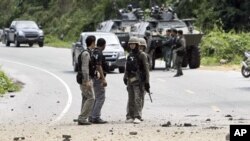An insurgent attack on an army base in southern Thailand left at least four dead, and is being seen as a bold attack in a region where violence has claimed over 4,000 lives since 2004.
The Thai army says at least 30 insurgents were involved in the raid on a small army camp in the southern province of Narathiwat. The insurgents stormed the armory and made off with assault rifles, submachine and machine guns.
The attack late Wednesday is being compared to a January 2004 raid on an army base that marked an escalation in insurgent attacks in the largely Muslim southern provinces.
Panitan Wattanayagorn, the Thai government spokesman, said Thursday there had been indications of a threat to security forces. "We actually had some warning relating to the latest incident in Narathiwat a few days ago but the area is very difficult to control. It remains one of the strongholds of the militant groups. We issued warning to those officers in the area a few days ago to warn them that they will be a possible target but sadly they were not able to defend themselves," Wattanayagorn said.
Intelligence sources said the raiders also attacked reinforcements coming to aid the camp, which they said indicated it was a well-planned and determined operation.
The Thai government says a fall in the number of attacks in the past year shows it is making progress in reducing the violence in the south.
Since 2001, Thailand has struggled with separatist violence in its southern provinces, which border Malaysia. While Thailand is largely Buddhist, 10 percent of the population is Muslim and mostly lives in the provinces of Narathiwat, Pattani, Yala and Songkhla.
The insurgents, however, have not publicly declared their goals. Past government efforts to crack down on the insurgents and build up military control of the region have not ended the fighting. More than 4,000 people have died in the violence since 2004.
The current government wants to demilitarize the region and recently lifted state of emergency decrees in several southern districts. It also hopes to increase civilian control through a special administrative center.
But police reports, seen by VOA, say attacks in 2010 maintained a climate of fear. Bombings inflicted heavy civilian and government casualties. Drive-by shootings are viewed as aimed at forcing Buddhist families to move to other provinces.
Benjamin Zawacki, a Thailand researcher for rights group Amnesty International, says the violence has intensified to the point it is no longer a low-level insurgency. "It has reached that level of being an internal armed conflict as opposed to just an insurgency or what the government has been claiming for years - sort of low-level banditry and an amalgam of insurgents with crime. We do acknowledge that there is an element of all of those things put together but we don’t feel it can be dismissed. There is a genuine armed conflict in the south," he said.
As many as 1,000 troops have been sent to the region to hunt the insurgents who attacked the army post.
Insurgent Attack on Thai Army Base Leaves at Least 4 Dead









